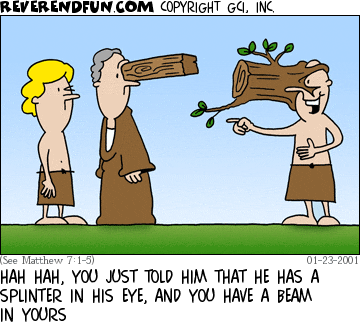A friend of mine, who is no fan of Trump as a person but does support many of his policies, told me of an event in town earlier this year that purported to offer a safe space for a multiplicity of perspectives in the midst of so much divisiveness and tribalism in this country. Eager to engage with people to the left and to the right of him, he was sorely disappointed when the overwhelming majority of the people in attendance and on the dais were extremely left-wing. "It wasn't so much that I disagreed with what was being said," my friend relayed to me, "but that both the remarks and the audience reaction to those remarks didn't seem to offer any room for dissent, that I would be booed or worse if I dared offer an alternative viewpoint." And of course reverse everything from this scenario, and there are abundant examples of left-leaning people feeling unwelcome or worse in largely right-leaning gatherings.
Inclusion of a multiplicity of opinions is all the buzz nowadays, in politics and in the church and in society. Thought leaders of all stripes lament the polarized climate we are in, as well as the self-reinforcing behavior we engage in that only widens the gap, which is that we increasingly cloister ourselves from dissenting opinions. To be sure, it is helpful to have safe spaces to believe what we believe without judgment, and sometimes the comfort of our own tribe is needed to have such a place. But if we truly believe in learning from let alone allowing different viewpoints, then we have to truly be welcoming of those viewpoints rather than shouting them down.
Most of us would have no disagreement with what I have just said. But we may still have a blind spot about whether we practice this in our own lives. Of course we are accommodating of people who are different from me, we would say; that sort of openmindedness is really important to us. Yet the thing about our perspectives is that they can have a blinding effect on our ability to see others' perspectives. Indeed, the stronger we feel about something and the higher the stakes and the more invested we have been in advancing what we believe is right, the easier it is to have a blind spot about ways we are unwelcoming to those who think differently from us. We literally cannot see how we are repelling others different from us, even as we are thinking and saying the exact opposite.
In the midst of one of his most famous sermons, Jesus himself said these words (in the seventh chapter of the gospel according to Matthew):
Why do you look at the speck that is in your brother’s eye, but do not notice the log that is in your own eye? Or how can you say to your brother, ‘Let me take the speck out of your eye,’ and behold, the log is in your own eye? You hypocrite, first take the log out of your own eye, and then you will see clearly to take the speck out of your brother’s eye.
The predominant interpretation of this commonly known story is that we shouldn't judge. Yet clearly that's now how Jesus ends his point. He wants us to be able to see the speck in our brother's eye. He just wants us to realize that we have a freaking log sticking out of our own eye.
This story comes to mind when I think about the push towards inclusion in the midst of our divided times. Surely we all have logs in our eyes that keep us from seeing clearly enough to take the speck out of our brother's eye. Would that we wish to engage with, learn from, and positive influence those around us, but that we do so with a humility that comes from knowing that sometimes we can't even see how we are being unwelcoming with our words and actions when in fact we are trying to do the exact opposite.
73-91 born SEA lived SJC 00 married (Amy) home (UCity) 05 Jada (PRC) 07 Aaron (ROC) 15 Asher (OKC) | 91-95 BS Wharton (Acctg Mgmt) 04-06 MPA Fels (EconDev PubFnc) 12-19 Prof GAFL517 (Fels) | 95-05 EVP Enterprise Ctr 06-12 Dir Econsult Corp 13- Principal Econsult Solns 18-21 Phila Schl Board 19- Owner Lee A Huang Rentals LLC | Bds/Adv: Asian Chamber, Penn Weitzman, PIDC, UPA, YMCA | Mmbr: Brit Amer Proj, James Brister Society
Subscribe to:
Post Comments (Atom)
Too Short for a Blog Post, Too Long for a Tweet 513
Here are a few excerpts from a book I recently read, "Man's Search for Meaning," by Viktor Frankl. While we were waiting for...

-
PHILADELPHIA NAMED BEST CITY FOR NEW GRADS How about Philly besting Boston, New York, Chicago, Atlanta, and every other city in America for ...
-
I recently had a humorous but telling incident on my bus ride into work. It being rush hour, the vehicle is often crowded and even standin...


No comments:
Post a Comment